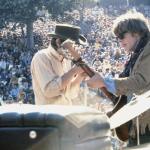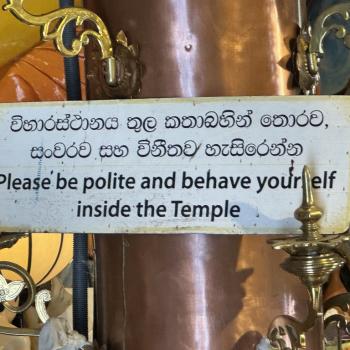It’s been just over a year since I found my beloved colleague of 20 years dead in his home. He hadn’t shown up for his Monday classes and didn’t answer his phone, so since we live near one another, I volunteered to stop by his house. His door was open and he was in his living room where he had apparently died of a cardiac event. It was his last semester of teaching before he had planned to retire in the Pacific Northwest.
Just five years earlier we had together mourned the death of another long-term colleague and mentor who had died of cancer–also in the last year he had planned to teach. Both Ben McArthur and Mark Peach had taught me as undergrads, had served for over 35 years as colleagues on our campus, and were delightful coworkers. I have mourned them by participating in their memorial services, helping to distribute their books, making sure their records are archived, and finding their replacements in our department. And I miss both of them every day.
I tell my students that historians love dead people. We love the dead by remembering them. My Christian students are a bit taken aback when I tell them “God loves dead people. God doesn’t have an ‘alive bias.’ We prefer people who are alive, but God doesn’t. He loves dead people in the same way he loves the living. And we get to think and love a bit more like him when (as history students) we choose to love and prioritize dead people.” They look at me like they think this might be heresy, but I am standing by it.
Perhaps as historians we are society’s professional rememberers. And perhaps we can help our communities think about what it means to mourn and remember those we love when they die. For instance, from time to time, I ask my students to think of someone in their life who has died and who still influences them or their family. Or maybe who they love even though they are gone. This is a sobering activity, but virtually all my students have someone who is still present in their lives, despite having passed away. This act of remembering can actually help them continue to feel affection for and connections with this person who is no longer with them. And it makes my students a little bit more aware of their own mortality, which is always an important skill.
Growing up, my mother told me stories of her younger brother who had died when he was 17 in a farm accident. I never met my Uncle Doug, but I feel like I would know him if he walked around the corner. My mother’s family loved telling stories about Doug’s sense of humor, his daily trials, his affection for all weak and juvenile animals. We inherited his banjo and he continues to be part of our family in spite of his having never met most of us. This gave me a strong sense of history and of the connections we can have to the future.
Perhaps it is this Clark family’s strong sense of connection to loved ones past and present that caused my 7-year-old nephew to communicate an inaccurate, but admirably confident desire to shape those who come after us. He was very sick and as my sister was caring for him, he dramatically turned to her with this request: “Mom, if I die, will you tell my grandchildren about me?”
While we laughed at his understanding of how one obtains descendants, there is actually something deeply true about our connection to those who come after, whether by biological descent or not. And the more we think about and seek connections to those who went before, the more we can be responsible to those who come after—and be careful about how we make decisions and form community for them to flourish in. Parents and grandparents often have regrets alongside their gratitude as their lives draw to a close. They want good things for those they leave behind, but because they are flawed humans, they may have a perspective at the end of their lives that they couldn’t have had along the way. Historians can be instructive in the unintended consequences of our behaviors and those of our ancestors—we can help us collectively think through the legacies of imperfect people who both blessed us and made mistakes.
When I remember my colleagues Mark and Ben, I think about what advice they would give me as we process a university policy change. Or how they would laugh in a discussion about which readings to assign students. I read their handwritten notes in the books I inherited from them, and think about the unique way they each had for what subjects they taught and which articles they wanted to bring by my office to share. When I was dealing with the tragedy of Mark’s unexpected death, a friend emailed me that our society has few ways to express sadness for the loss of a long-term colleague. I realize that I was very blessed to work with these devout and delightful scholars and to operate within a small but affectionate department.
Still, it has benefited me to see the difference in how I was able to mourn their deaths. Mark was not expecting to die, and our department reeled for months from the impact of his loss. I knew that Mark struggled with depression and with regrets for how he had parented his son. The affection of generations of students couldn’t replace that. Mark would have been horrified at the effort it took us to recover from his death and the work we had to do to wind up his life. As I arranged for his memorial service, I was aware that I was curating a particular view of Mark that wasn’t one his family might recognize. It was no less true for being one-sided, but it was indeed a particular way of being remembered.
Ben had no regrets except that he wasn’t going to get to see his grandchildren grow up or his son finish graduate school. He felt lucky in his life. He wrote a letter to be emailed to the students in our department upon the news of his death. He organized the giving away of all his books. He edited my eulogy and wrote his own life sketch. I was able to record some conversations with him and take a photo with him on the last visit I had with him. Most of those who spoke at his memorial were other historians. He also has a particular way he is remembered, one which he curated himself.
So I’ve come full circle. I love the dead when I remember them, but also, when I remember that I will die, I can love those who live beyond me better. When we take history seriously—our own history and that of our community—when we realize that we will end, that we won’t live on this earth forever, we can be better citizens and loved ones. We can tell our stories, decide what to keep and what to give away, make sure we are in good relationship with those around us, and tell the truth. This allows for much healthier mourning and moving forward.
While 1 Thessalonians 4:13 indicates that Christians don’t mourn in the same was as do those who have no hope, but we are still sad about the death of our loved ones. I’m not going to pretend that I think Mark’s unexpected death was what our God wanted. But I look forward to seeing him and Ben in the New Earth. And I’m grateful for the words of Mary Oliver:
“Poppies”
The poppies send up their
orange flares; swaying
in the wind, their congregations
are a levitation
of bright dust, of thin
and lacy leaves.
There isn’t a place
in this world that doesn’t
sooner or later drown
in the indigos of darkness,
but now, for a while,
the roughage
shines like a miracle
as it floats above everything
with its yellow hair.
Of course nothing stops the cold,
black, curved blade
from hooking forward—
of course
loss is the great lesson.
But I also say this:
that light is an invitation
to happiness,
and that happiness,
. . .
when it’s done right,
is a kind of holiness,
palpable and redemptive.
Inside the bright fields,
touched by their rough and spongy gold,
I am washed and washed
in the river
of earthly delight—
and what are you going to do—
what can you do
about it—
deep, blue night?














